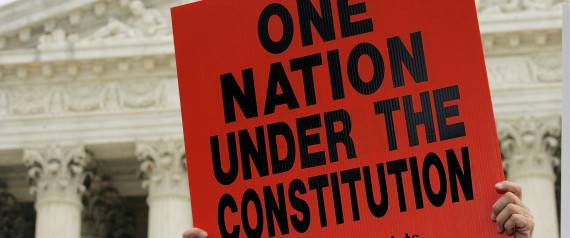
Any decent, red-blooded American politician loves the Constitution. It seems fair, then, to expect these politicians to respect the very first right established by that great document: "Congress shall make no law respecting an establishment of religion, or prohibiting the free exercise thereof."
These are the first words of the First Amendment. They come just before the words that lay out the rights to free speech and a free press, the rights to peaceably assemble and to petition the government for a redress of grievances. Together, the establishment clause and the free exercise clause form the basis of the American concept of separation of church and state, which compels the government to give equal treatment to all religions -- and to respect the absence of religion -- and which grants U.S. citizens the freedom to embrace or reject any faith they choose.
This all sounds relatively simple. But if you look at the political landscape, you'll find a surprising number of cases where people are trying to blur the church-state line, or else hop right over it. It's a struggle that can be felt at the most basic level, in classrooms and public parks and municipal buildings everywhere.
While there are some legitimate debates to be had about what, exactly, the government can and can't do when it comes to protecting religion -- the Supreme Court has considered this issue in a number of cases -- the examples below suggest that many lawmakers are trying their hardest to chip away at the separation between church and state.
Who Needs Amendments When You Have Commandments
Arkansas state Sen. Jason Rapert (R) was oddly confident that he wasn’t violating the Constitution earlier this year when he filed a bill requiring the secretary of state to erect a privately funded monument honoring the Ten Commandments at the state Capitol in Little Rock.
“It’s not a religious statement at all. It’s more historical from my perspective, because of the incorporation and the well-known and well-discussed and well-documented fact that much of our judicial system today is based off of the 10 Commandments,” Rapert said of Arkansas Senate Bill 939.
Lawmakers in the state House also declared that it wasn't controversial to suggest that the Founding Fathers believed in a “higher law” ordained by a “creator,” and that paying homage to the Ten Commandments at the Arkansas Capitol would help people understand the Old Testament decree as "the moral foundation of the law."
Supporters of the separation of church and state have vehemently denied that U.S. law is rooted in the Ten Commandments, even noting that the first commandment -- "Thou shalt have no other gods before me" -- is itself a violation of the First Amendment's religious protections. In fact, the Freedom From Religion Foundation (FFRF) points out that seven of the Ten Commandments forbid actions that are perfectly legal under U.S. law.
But in a 2005 decision, the Supreme Court ruled that the display of the Ten Commandments on public land is not, in itself, a violation of the establishment clause of the First Amendment (although the ruling doesn't extend to cases where the commandments are displayed inside buildings). In a 5-4 opinion, justices ruled that such outdoor displays are more about the nation's tradition of recognizing the Ten Commandments' historical meaning, not the text's literal applications.
The Arkansas bill sped through the legislature and was signed into law by Gov. Asa Hutchinson (R) in April.
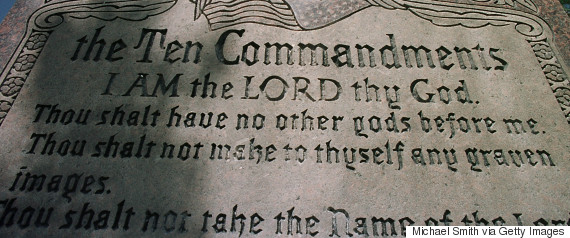
A Ten Commandments sculpture is seen in front of City Hall in Grand Junction, Colorado, in 2001. (Photo by Michael Smith/Getty Images)
We Must Protect The Word 'God'
In 2013, the Air Force made the phrase "So help me God" an optional part of its oath for enlistment and appointment. Rep. Sam Johnson (R-Texas) expressed his concern that some cadets and officers would no longer be required to swear their loyalty in a religious context. This past March, Johnson introduced the Preserve and Protect God in Military Oaths Act of 2015. The bill would require Congress to sign off on any changes to military oaths and some civil service oaths.
In a press release accompanying the bill, Johnson offered the following statement:
Our Constitution’s very First Amendment protects every individual’s freedom of religion. But our servicemen and women who protect our county with their lives are seeing that freedom under fire.
In 2013, the U.S. Air Force Academy made the phrase “so help me God” optional in the oath each cadet takes. And why did they do this? Because of one radical atheist group’s demands!
Let me be clear: Americans have the freedom of religion – but not freedom from religion. That’s why I am introducing legislation that requires Congressional approval before any change would be made to military oaths.
The moral foundation of our country is in serious danger if we allow radical groups to dictate whether or not we can freely express our religious beliefs! It’s time to take a stand.
So much for the religious freedom of Air Force personnel who don't have a religion. The bill has yet to receive a vote.
'In God We Trust,' And Don't You Forget It
County commissions around the country took steps this year to remind everyone who enters local government buildings that God plays a role in whatever goes on inside.
In Miami-Dade County, Commissioner Jose "Pepe" Diaz sponsored a bill to prominently display "In God We Trust" in the commission chamber. The bill ended up passing.
"Displaying the national motto 'In God We Trust' recognizes the important role faith plays in our lives as citizens, and hopefully it will also serve to guide us in our decision making as lawmakers," said Diaz in May.
In North Carolina, "In God We Trust" is going up on government buildings all over the state, thanks in part to lobbying efforts by the U.S. Motto Action Committee, a group that seeks private funding to pay for the words to be installed on various public buildings. While the presence of these words in such venues has been criticized by advocates of separation of church and state, courts have largely come down in favor of the displays, ruling that they're primarily about tradition and that the phrase "In God We Trust" has lost its theological meaning since it was adopted as a national motto in 1956.
But when lawmakers like Diaz talk about the phrase reinforcing the "important role" of faith and "guiding us in our decision-making as lawmakers," it's hard to make the case that displays of "In God We Trust" always happen for purely secular reasons.
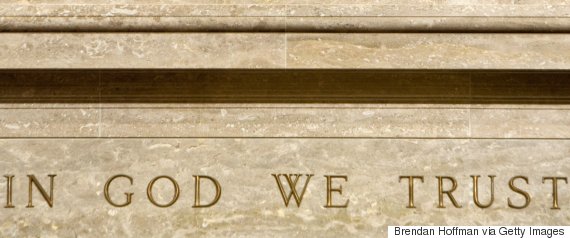
The motto "In God We Trust" is seen over the Speaker's rostrum in the U.S. House of Representatives chamber in 2008 in Washington, D.C. (Photo by Brendan Hoffman/Getty Images)
We'll Make Extra-Sure Kids Can Pray In School
In 2007, the Illinois state legislature passed the Silent Reflection and Student Prayer Act, requiring schools to observe a moment of silence at the beginning of each day. The act was ruled unconstitutional two years later, but the ban was overturned in federal court in 2011.
Now we have the Silent Reflection and Student Prayer Act of 2015, an amendment to the original law that includes some new provisions. The new bill would require that Illinois schools allocate non-instructional time before or after classes so that students who want to pray can do so. The bill also aims to protect religious-based group meetings -- it mentions groups known as BIBLE clubs, for "Basic Instructions Before Leaving Earth" -- as long as they're not “sponsored, promoted or endorsed in any manner by the school.”
Critics have pointed out that all of these activities are already legal. Skeptics of the bill say that it would simply open up the door to accusations that the separation of church and state has been violated.
At any rate, the bill has passed both chambers of the Illinois state legislature and is awaiting action by the governor.
Let's Make The Bible The State Book
It seems some Tennessee lawmakers really thought this one would fly: Earlier this year, the state House passed a measure to establish the Bible as the state's official book. The bill largely had the support of the state's residents. A day after the bill cruised through the Tennessee House, however, the state Senate managed to kill it for the year with a procedural maneuver -- to the likely relief of politicians on both sides of the aisle who'd reportedly seen the bill as a pretty clear-cut violation of the separation of church and state.
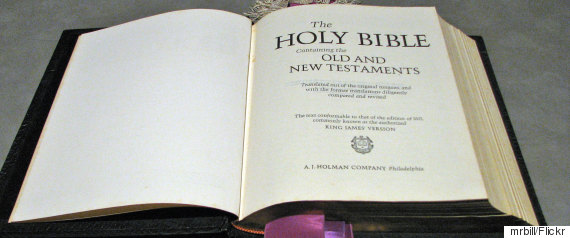
And Then, Pray For The State's Students...
In Tennessee earlier this year, lawmakers passed a measure to require the governor to designate an annual occasion known as "Tennessee's Weekend of Prayer Over Students." According to the bill -- which has since been signed into law -- this annual event, to be observed during the first weekend in August, will be a chance for Tennessee residents to "in accordance with their own faith and consciences, turn to prayer, meditation, or otherwise give thanks for the students of this state as well as their teachers, administrators, and schools."
Or, you can choose not to. Whatever. But if you want to, this is totally the weekend to do it? Or something.
...Or Just Pray For Whatever You Want
Lawmakers in Pennsylvania overwhelmingly passed a bill earlier this year to designate the first Thursday in May as the "National Day of Prayer" in Pennsylvania. The measure struck some strict separationists as an effort to promote a clearly religious activity. In the end, however, the resolution proved totally pointless: There's already a "National Day of Prayer," it's already observed on the first Thursday in May, and people in Pennsylvania and every other state can already pray, or not pray, whenever they want to.
We'll Put Nativity Scenes Anywhere We Please...
A bill proposed in Alabama earlier this year would have explicitly permitted the presentation of Christmas images, nativity scenes and Christmas trees on public property, so long as they "had a secular purpose and did not advance a particular religion."
The Freedom From Religion Foundation has argued that the Alabama billsignificantly misreads a 1984 Supreme Court decision about public holiday displays. While the bill passed an initial vote in the state Senate, it has since stalled in the state legislature.
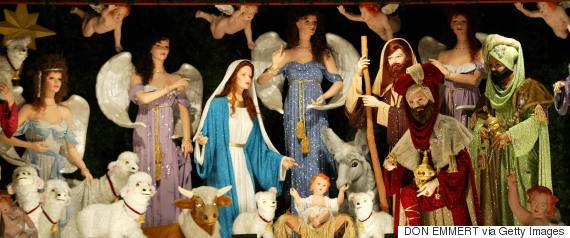
A nativity scene is shown as part of a Christmas light display on a house in New York in 2003. (DON EMMERT/AFP/Getty Images)
...And We'll Win The 'War On Christmas'
The perennial conservative outrage over a so-called "war on Christmas" has given rise to a handful of "Merry Christmas" bills around the nation in the past few years. Indiana was among the states to take up the cause this year, with a piece of legislation designed to protect students and school employees who want to say "Merry Christmas" -- or offer other religion-specific greetings -- during the holiday season. The bill would have also allowed the display of religious symbols, as long as "the display includes a scene or symbol of: (1) more than one (1) religion; or (2) one (1) religion and at least one (1) secular scene or symbol."
While lawmakers said the bill was needed to shield schools from lawsuits about potential violations of the separation of church and state, critics pointed out that a state law still wouldn't trump constitutional considerations about such issues. The Indiana Senate passed the bill earlier this year, but it was never considered by the full state House.
Gotta Keep Creationism In The Classroom!
For the fifth year in a row, Louisiana lawmakers rejected a piece of legislation in April that would have repealed the state's Science Education Act, which critics say allows public school science teachers to include creationism in their lesson plans. In a 4-3 vote, a state Senate committee shelved the measure following a hearing that included one lawmaker and LSEA supporter suggesting that scientists had burned heretics at the stake centuries ago. Maybe Louisiana also needs to reconsider its world history curriculum.
Earlier this month, activist Zack Kopplin, one of the most vocal opponents of the LSEA, found evidence that at least one teacher in Louisiana had actually used the Bible as a textbook in a biology class. Kopplin has also uncovered documents showing that teachers in a number of Louisiana schools have introduced religious materials to their classrooms in an effort to present them as counterpoints to evolution.
It's hard to violate the separation of church and state more than that.
Some Lawmakers Are Making The Separation Of Church And State Seem Like A Total Joke - Nick Wing and Julia Craven
The founders gave us a Godless Constitution - with wording that clearly separates church and state:
"Congress shall make no law respecting an establishment of religion, or prohibiting the free exercise thereof."
Last edited:

